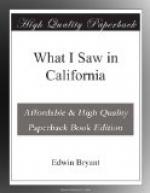After passing two or three deserted houses, we reached an inhabited rancho, situated at the extremity of a valley, and near a narrow gorge in the hills, about four o’clock, and, our jaded animals performing duty with reluctance, we determined to halt for the night, if the prospect of obtaining anything to eat (of which we stood in much need) was flattering. Riding up to the house, a small adobe, with one room, and a shed for a kitchen, the ranchero and the ranchera came out and greeted us with a hearty “Buenas tardes, Senores, paisanos amigos,” shaking hands, and inviting us at the same time to alight and remain for the night, which invitation we accepted. The kind-hearted ranchera immediately set about preparing supper for us. An Indian muchacha was seated at the metate (hand-mill), which is one of the most important articles of the Californian culinary apparatus. While the muchacha ground, or rather crushed, the wheat between the stones, the ranchera, with a platter-shaped basket, cleansed it of dust, chaff, and all impure particles, by tossing the grain in the basket. The flour being manufactured and sifted through a cedazo, or coarse sieve, the labour of kneading the dough was performed by the muchacha. An iron plate was then placed over a rudely-constructed furnace, and the dough, being beaten by hand into tortillas (thin cakes), was baked upon this. What would American housewives say to such a system as this? The viands being prepared, they were set out upon a small table, at which we were invited to seat ourselves. The meal consisted of tortillas, stewed jerk beef, with chile seasoning, milk, and quesadillas, or cheesecakes, green and tough as leather. However, our appetites were excellent, and we enjoyed the repast with a high relish.
Our host and hostess were very inquisitive in regard to the news from below, and as to what would be the effects of the conquest of the country by the Americans. The man stated that he and all his family had refused to join in the late insurrection. We told them that all was peaceable now; that there would be no more wars in California; that we were all Americans, all Californians—hermanos, hermanas, amigos. They expressed their delight at this information by numerous exclamations.
We asked the woman how much the dress which she wore, a miserable calico, cost her? She answered, “Seis pesos” (six dollars). When we told her that in a short time, under the American government, she could purchase as good a one “por un peso,” she threw up her hands in astonishment, expressing by her features at the same time the most unbounded delight. Her entire wardrobe was soon brought forth, and the price paid for every article named. She then inquired what would be the cost of similar clothing under the American government, which we told her. As we replied, exclamation followed upon exclamation, expressive of her surprise and pleasure, and the whole was concluded with “Viva los Americanos—viva los Americanos!” I wore a large coarse woollen pea-jacket, which the man was very desirous to obtain, offering for it a fine horse. I declined the trade.




